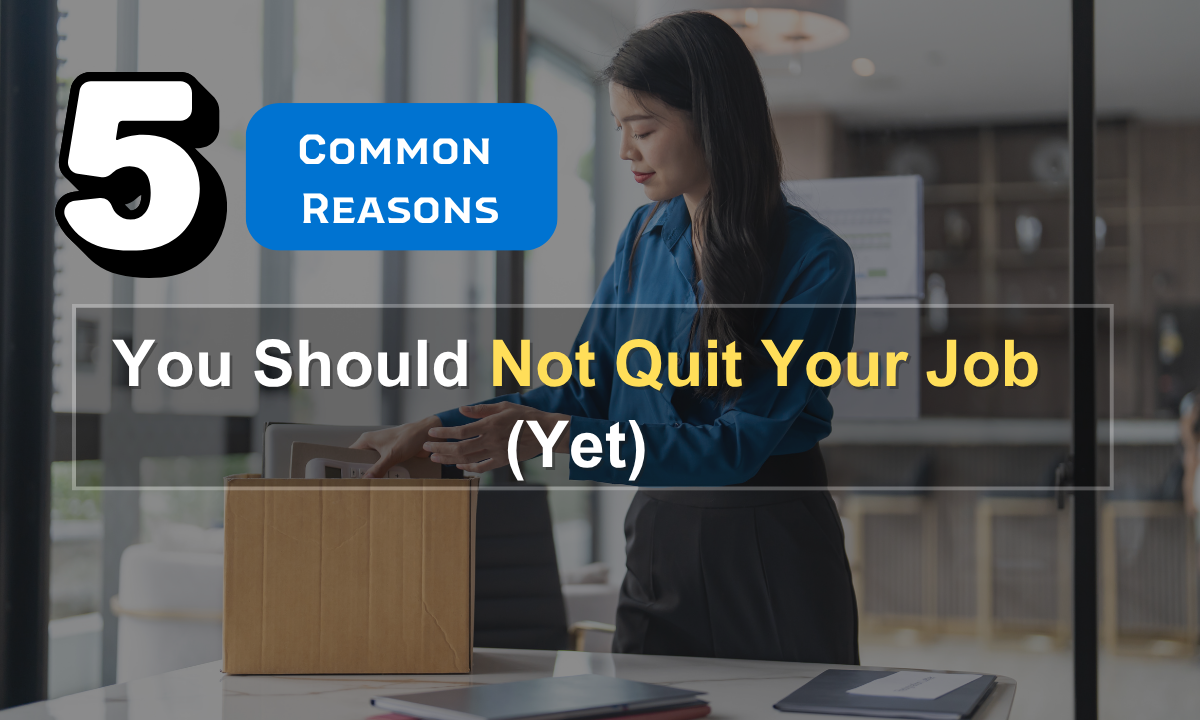Think Twice: 5 Common Reasons You Should Not Quit Your Job (Yet)
5 Common Reasons You Should Not Quit Your Job : Let’s face it—there are days when you just want to walk out of your job and never look back. Maybe it’s your boss’s unreasonable demands, your company’s sinking future, or just the feeling of being stuck. But before you hit “send” on that resignation email, take a deep breath. Quitting your job in the wrong way, or at the wrong time, can do more harm than good.
Here’s a breakdown of five situations where quitting your job might not be the best move—and what to do instead.
1. Don’t Quit in a Fit of Anger or Frustration
Scenario: You had a heated argument with your manager, or you’re just sick of the office politics.
Why It’s a Mistake: Resigning in an emotional moment can leave a lasting negative impression. Employers and colleagues often remember how you leave, not just how you worked. Burning bridges can hurt your chances for future references and even networking opportunities.
What to Do Instead:
- Give yourself 48 hours to cool off before making any decisions.
- Talk to someone you trust—a mentor or colleague—for perspective.
- Consider a transfer, internal switch, or even professional help to deal with workplace stress.
Real-World Example: Sarah, a digital marketer in New York, felt cornered during a performance review and almost resigned the same day. Instead, she took the weekend to reflect and ended up initiating a role change within the same company—now she leads a new team
2. Don’t Quit Just Because the Company Is Struggling
Scenario: Rumors are flying—your company might shut down soon.
Why It’s a Mistake: While jumping ship might seem smart, leaving too early without a plan can backfire. If your resume shows a sudden exit during hard times, future employers may assume you abandoned ship, rather than helping out during a crisis.
What to Do Instead:
- Use this time to upskill, take on cross-functional roles, and document your contributions.
- Build strong relationships—you never know who might offer you your next job.
- Begin your job search quietly, but don’t quit until you have something solid lined up.
Bonus Tip: Hiring managers love stories of resilience. Saying “I stayed back and helped until the end” can show leadership and loyalty
3. Don’t Quit After a Failure or Setback
Scenario: A big project failed, and you’re embarrassed or discouraged.
Why It’s a Mistake: Resigning after a failure can appear like you were pushed out, even if you left voluntarily. It also signals a lack of grit—something many companies actively screen for.
What to Do Instead:
- Own up to the failure. Reflect on what went wrong and how you can improve.
- Ask for feedback and turn it into actionable steps.
- Show you’re willing to bounce back—resilience is a key trait that recruiters admire.
Quick Insight: Many successful professionals, from Oprah Winfrey to Steve Jobs, faced failure before making comebacks. Use your setback as a stepping stone.
4. Don’t Quit Without Another Job Lined Up
Scenario: You just want out—even if it means being unemployed for a while.
Why It’s a Mistake: Unfortunately, the job market often favors the employed. Gaps on your resume raise red flags. Plus, job hunting while unemployed can be emotionally and financially draining.
What to Do Instead:
- Begin the job search while you’re still employed. Set weekly goals—send out 5 applications, attend 2 networking events, etc.
- If needed, take short breaks (vacation or unpaid leave) to recharge instead of resigning.
- Work with a career coach to find your next best move.
Case Study: Raj, an IT consultant in London, stuck it out at a job he disliked for 3 extra months while searching. He used that time to take a cloud computing course—and landed a higher-paying job because of it.
5. Don’t Quit Without a Financial Safety Net
Scenario: You’ve decided enough is enough—but haven’t reviewed your savings account.
Why It’s a Mistake: Living without a paycheck is tough, and stress about money can impact your ability to think clearly, let alone find a new job.
What to Do Instead:
- Calculate how many months you can survive without a new income. Ideally, save up 3–6 months of living expenses.
- Reduce unnecessary spending and build an emergency fund before quitting.
- Consider freelance or part-time work as a buffer while you job-hunt.
Simple Formula to Know You’re Ready to Quit Financially:
Monthly Expenses × 6 = Minimum Emergency Fund
If your expenses are $2,000/month, you should ideally have $12,000 saved before taking the leap.
✅ Takeaway: Quit Smart, Not Fast
Quitting your job is a big decision—and timing is everything. While there are legitimate reasons to resign, make sure you’re not doing it:
- In anger or haste
- Without a backup plan
- Just because times are tough
- Because of a single failure
- Or without financial preparedness
Instead, stay strategic. Use difficult times to build character, gain experience, and set yourself up for a smoother, smarter transition.
🔍 Frequently Asked Questions (FAQs)
Q1. Is it better to quit or get fired?
A: Quitting can give you more control over the narrative, but being fired may allow you to claim unemployment benefits (depending on your country). Evaluate your situation carefully.
Q2. Can quitting hurt my career?
A: Not if done professionally and with a plan. Impulsive quitting without explanation, however, can raise concerns for future employers.
Q3. How much money should I save before quitting?
A: Aim for 3–6 months’ worth of living expenses, especially if you don’t have another job lined up.
